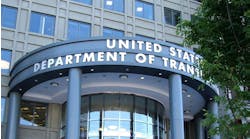Commercial truck drivers across America have ended up in the crosshairs of nationwide protests in response to the death of George Floyd, an unarmed black man killed at the hands of police in Minneapolis. Protests, as well as rioting and looting in some areas, temporarily shut down major roadways and interstates, and created even greater safety concerns for truck drivers who are still trying to deliver essential goods amid the global pandemic.
“We’ve got COVID-19 and as if that wasn’t bad enough, now we’ve got all these protests and rioting, especially here in Minnesota,” said Jackie Giefer, director of operations for Bay & Bay Transportation, during a WorkHound webinar on June 3.
The webinar presentation focused on long-term effects of COVID-19 on the trucking industry, but the Q&A portion included discussion of what panelists had been hearing from drivers regarding recent protests. Mark Walker, chairman and CEO of TransLand, and Rebecca Brewster, president and COO of the American Transportation Research Institute (ATRI), joined Giefer as speakers during the event.
“The only way we can handle [the protests] is case by case,” Giefer explained, adding that the company receives alerts from customers in Minnesota and elsewhere informing dispatchers and drivers where there are protests scheduled or riots happening. “Otherwise, our approach has been if you don’t feel safe, don’t go. That’s really all we can tell our drivers at this point.”
Walker explained that as with COVID-19, communication between drivers and fleet managers is critical right now. Referring to the ongoing protests and the pandemic as a “transformation crisis,” Walker emphasized the importance of overcommunicating and listening.
“We really have to understand where our drivers are coming from, and then we have to reinforce the core values that all of our companies are built on,” he explained. “The key core value is safety. We do not want to put anyone in harm’s way. There is not one load of cargo that is more important than a driver’s safety. We will be reinforcing that and just continuing to overcommunicate and over listen.”
The questions drivers are asking during these protests are the same questions they asked at the start of the pandemic, Walker added.
“It’s shaped a little differently, but it’s the same level of anxiety and personal concerns for safety,” he said. “It was day-two [into the pandemic] and our drivers were asking us, ‘What is TransLand going to do for us if we get sick on the road somewhere and are 1,000 miles away from home?’ They just wanted to know that we were going to take care of them. We learned immediately that we had to address that head on.”
“Our core values are such that we’re going to do whatever it takes to connect drivers with their family,” Walked continued. “That’s what we all would do, but you have to say it explicitly. That’s where that intentional, purposeful communication is really helpful.”
Earlier on the morning of June 3, nine days after the death of Floyd and roughly a week into nationwide protests, a TransLand driver asked Walker what the company would do to protect drivers while they are out on the road. Walker told the driver to avoid those situations as much as possible.
“Do everything you can to get out of those situations,” Walker urged. “There is just no reason to go into areas that are unsafe.”
ATRI’s Brewster pointed to the information being released by state trucking associations to members via social media. Because of this communication, fleet managers have been able to communicate the latest road closures with their drivers, she pointed out.
“I think that is where you really see the value of association memberships. In times like this and since COVID-19 started, the American Trucking Associations and state trucking associations have put out detailed information,” Brewster noted. “This week I have seen a wealth of information about routes and other issues that drivers need to be aware of from the state associations.”
The Trucking Association of New York (TANY), for instance, sent out an alert to its members and posted safety recommendations and best practices on its social channels. In addition, Kendra Hems, president of TANY, told FleetOwner that the association has asked members to stay in touch regarding any issues they see or run into.
TANY has been sharing information it receives related to road closures, curfews, scheduled protests, etc., to its members. The association released the following suggestions to keep drivers safe:
- Plan for road closures.
- Contact the delivery location to get the most current and timely conditions.
- Plan ahead to park in a safe location outside the area and secure the truck.
- Drivers should keep their company posted and updated as they travel.
- Carriers should know where drivers are at all times.
- What the driver is observing may be different than what a dispatcher is seeing on a computer screen. Communication is key.
- Drivers and carriers should utilize all technology available to them.
“Other than that, the best we can do is encourage carriers to call ahead to their delivery/pick up locations to gauge the situation and determine if they feel it is safe to send their driver,” Hems explained, adding that in New York City, freight deliveries are still allowed during curfew hours, but many companies are not sending their drivers in.
“We’ve heard that drivers are hesitant to go into the city at night,” she said. “To some degree, they have more concerns going into the city now than they did during the height of COVID-19.”




